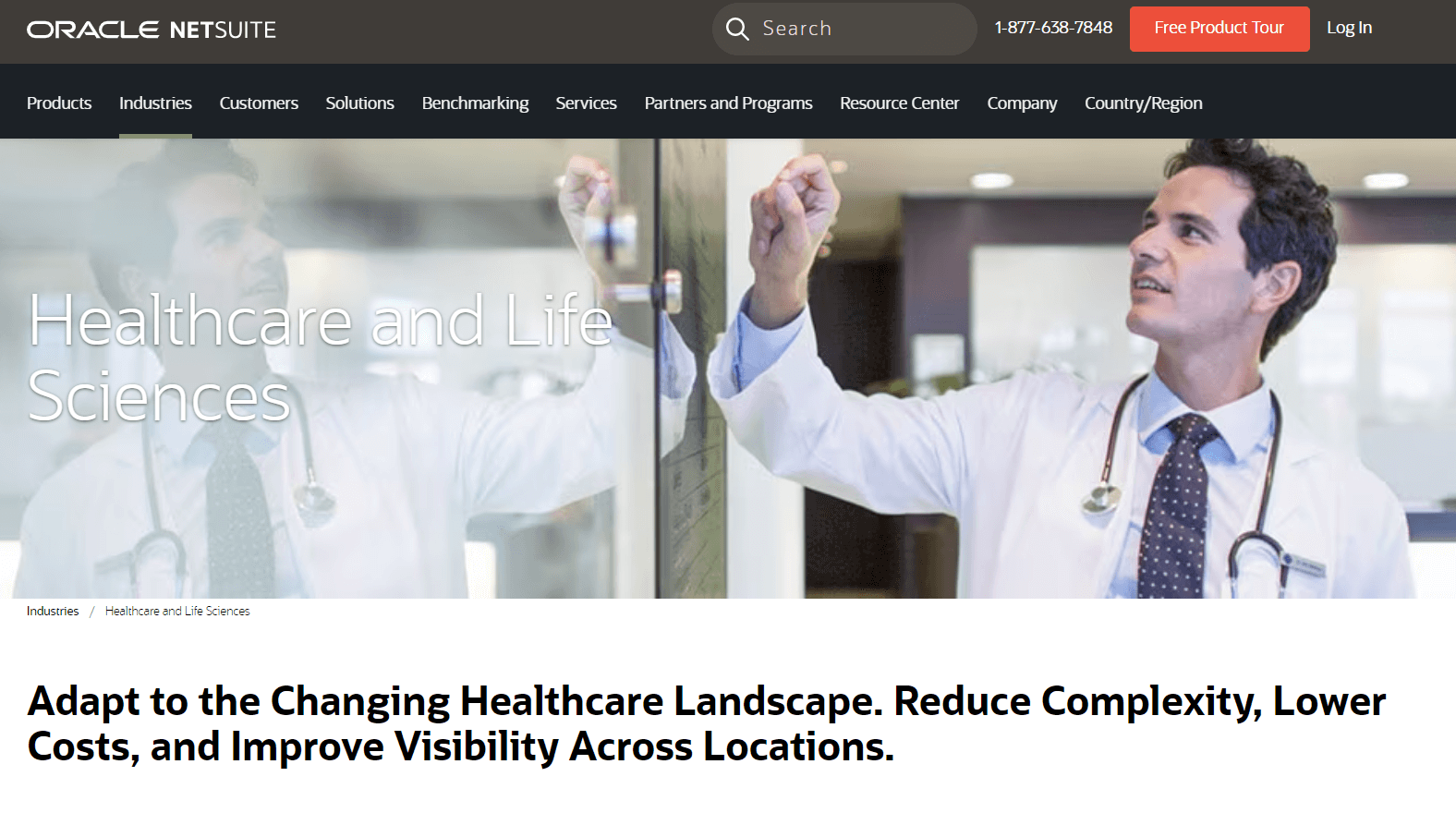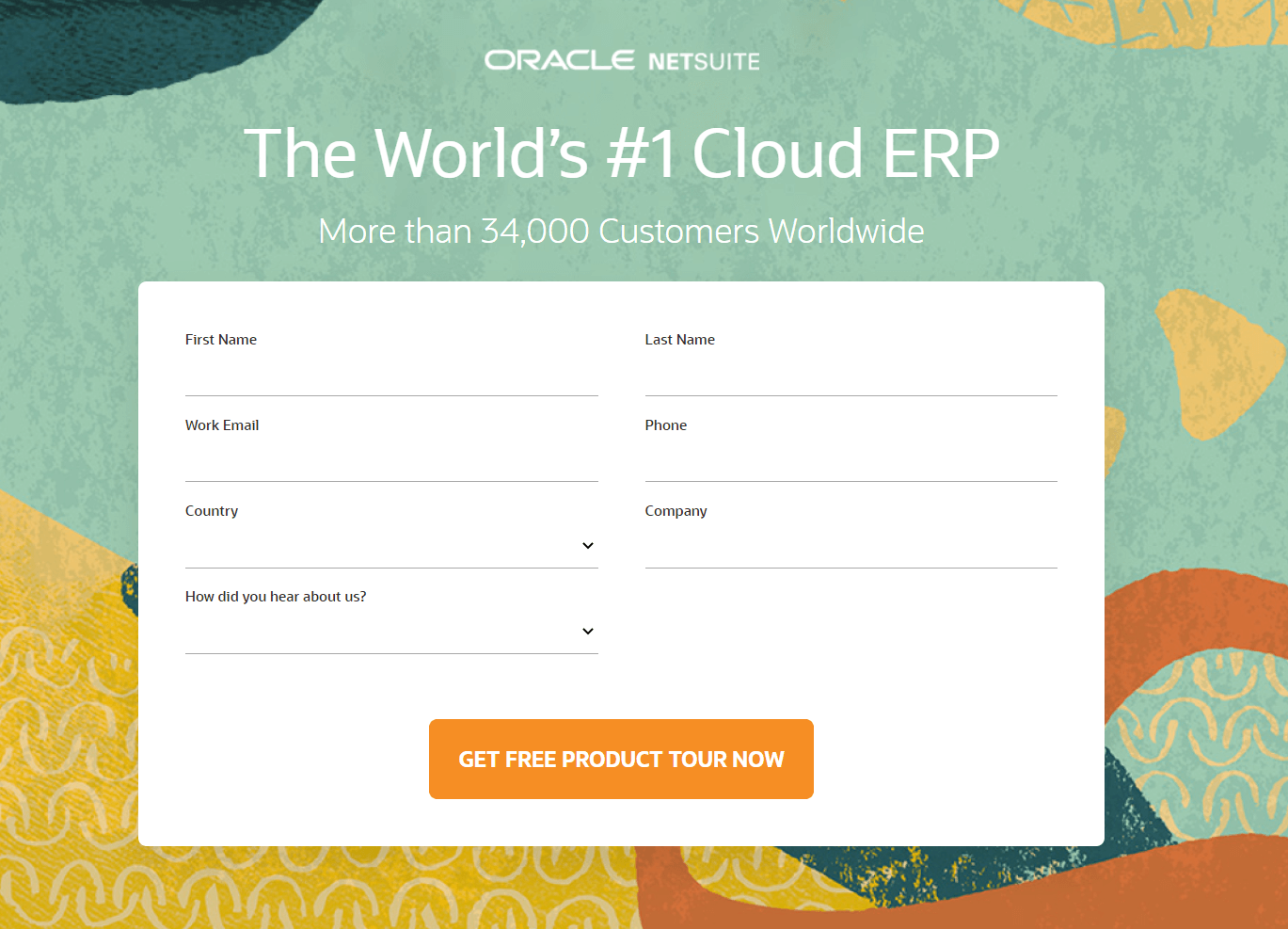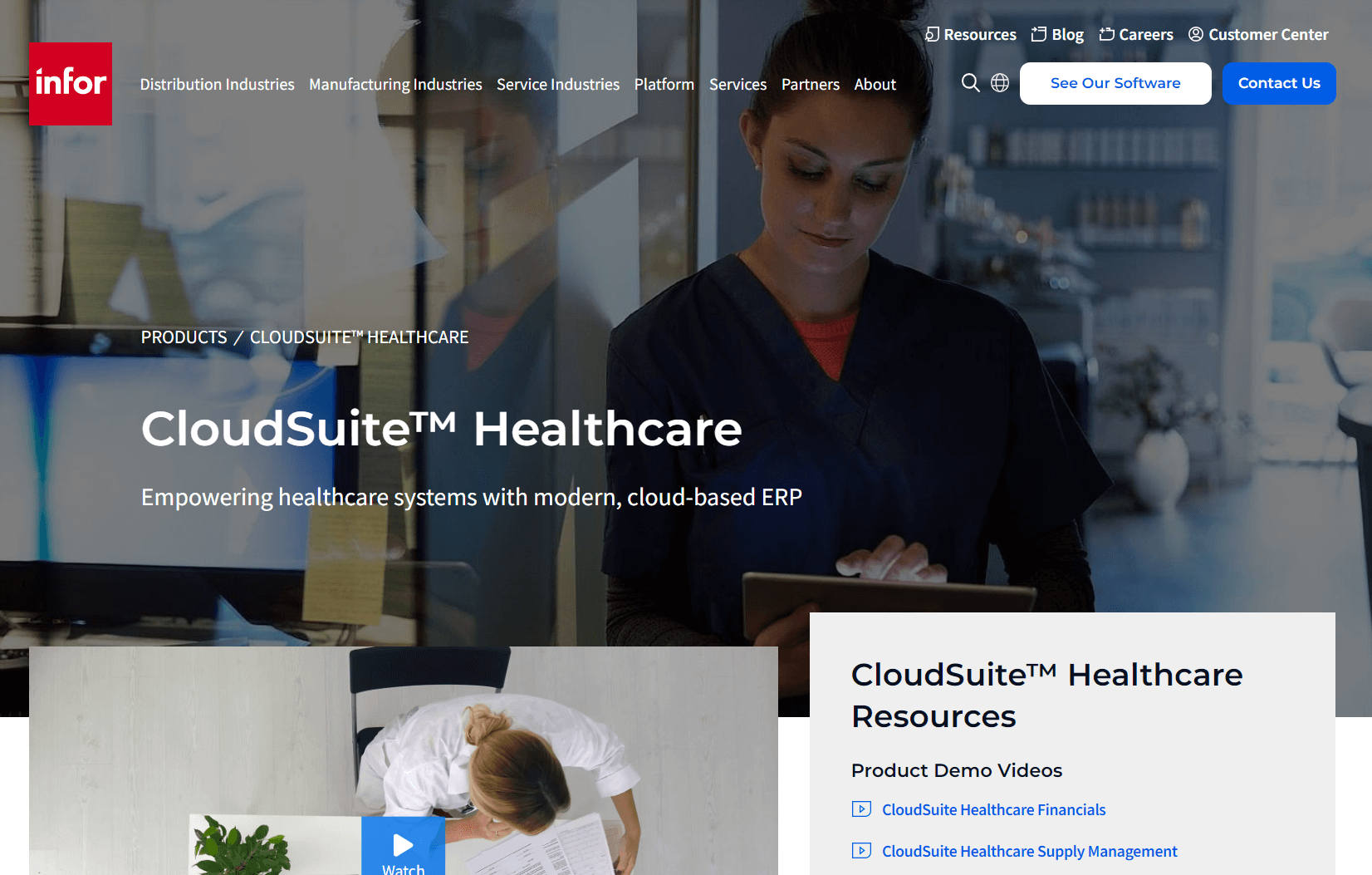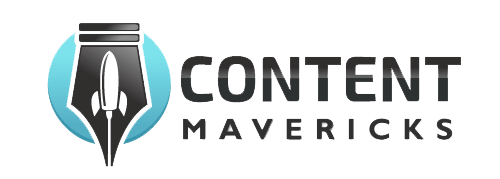Today there are 82 different healthcare ERPs. We spent 76 hours comparing the top 50 to find the seven best you can use to manage your healthcare practice or organization.
What is the Best Healthcare ERP?
- NetSuite — best of the best
- EnterpriseRx — best for pharmacies
- Infor — best for hospitals
- Acumatica — best for small and midsize organizations
- SAP S/4HANA — best for large organizations
- ERPNext — best for ecommerce retailers
- Microsoft Dynamics 365 — best for medical labs
1. NetSuite
Our Verdict — Best Of The Best
Price: Custom
NetSuite is a comprehensive healthcare ERP for organizations of all sizes. We think it's the best because of its comprehensive compliance features.
The Best Part:
- Strong compliance settings. NetSuite helps you efficiently manage compliance with detailed audit trails and real-time reporting.
The Worst Part:
- Difficult implementation. Customizing NetSuite to specific healthcare workflows can be complex and expensive, especially for bigger organizations.
Get it if you want a comprehensive healthcare ERP that’ll adapt to your growth over time and help manage all aspects of your organization.
I recommend you sign up for a free product tour.
(free product tour)
Best For
NetSuite is best for healthcare organizations that want a customizable ERP to streamline and automate complex workflows.
Top Features
- Centralized healthcare data management. Keep all your patient, staff, ward, and administrative data records fully organized in your ERP.
- Efficient asset and inventory management. Keep tabs on your stock levels, avoid shortages, and manage medical devices across all locations.
- Optimized warehouse management. Create a customized warehousing strategy for patient home deliveries and get dedicated tools for cartonization, cycle count planning, and shipping system integration.
- Advanced patient billing. Use SuiteBilling to improve the billing experience with automated invoicing, accurate charge capture for prescription refills, and seamless payment processing integration.
- Regulatory HIPAA compliance support. Facilitate internal controls and sleep soundly, knowing your sensitive patient data is protected according to regulations.
Pricing

NetSuite offers a single pricing plan:
Custom pricing: Monthly plan, for health organizations of all sizes that want an all-encompassing ERP to manage inventory, automate order management, and manage finances.
Try NetSuite today with a free product tour.
2. EnterpriseRx
Our Verdict — Best For Pharmacies
Price: Custom
EnterpriseRx is an end-to-end ERP system made for pharmacies. We think it's the best for pharmacies because of its efficient prescription process.
The Best Part:
- Streamlined prescription processing. EnterpriseRx automates prescription handling by enabling your pharmacy business to set up a home delivery service, synchronize recurring patients’ prescription refills, and manage inventory across multiple sales channels.
The Worst Part:
- Pricey subscription. Compared to alternatives such as Pioneer Rx or DRX, EnterpriseRx can be expensive for small pharma companies.
Get it if you want a top-notch pharmacy management ERP to handle prescriptions, inventory, and patient communications.
I recommend you reach out to EnterpriseRx via the website contact form to negotiate a yearly plan based on your needs.
(by filling out their contact form)
Best For
EnterpriseRx is best for busy pharmacy companies that want a comprehensive ERP to streamline and automate operations.
Top Features
- Swift prescription refills. Manage and automate prescription refills accurately to keep your patients well-stocked with medication at all times.
- Smart inventory control. Stay on top of your stock levels with real-time tracking, automated re-ordering, and detailed reports to keep those meds fully stocked, always.
- Hassle-free home delivery. Offer a convenient home delivery service to your customers, covering everything from over-the-counter medicines to prescription-only and controlled medications.
- Customizable, just like your morning coffee. Tailor workflows and processes to your pharmacy company’s unique needs and services.
- Interactive reporting dashboards. Generate detailed reports on your pharmacy’s performance to detect new customer trends, changes in inventory, and changing buying habits.
Pricing

EnterpriseRx offers a single pricing plan:
Custom pricing: Yearly plan, for pharmacies and pharmacy chains of all sizes that want a machine-driven ERP to efficiently manage patient data and prescriptions, track inventory in real-time, and create custom workflows for processes.
Try EnterpriseRx today by filling out their contact form.
3. Infor
Our Verdict — Best For Hospitals
Price: Custom
Infor is a scalable ERP that's perfect for hospitals. We think it's the best for hospitals because of its outstanding user experience. Even the most unexperienced employees will learn their way around Infor quickly.
The Best Part:
- Extremely user-friendly. Infor has a simple interface that your staff can easily navigate without any extensive training or technical knowledge.
The Worst Part:
- Not suitable for international organizations. Infor can’t be implemented for foreign countries that have different currencies, regulations, and processes.
Get it if you want a user-friendly healthcare ERP for your hospital to manage patient data, integrate medical devices, and improve staff productivity.
I recommend you reach out to Infor’s sales team using their contact form to discuss your needs.
(free product tour)
Best For
Infor is best for hospitals and healthcare providers that want a user-friendly ERP that can be easily integrated with their processes.
Top Features
- Seamless medical device integration. Connect all of your hospital’s existing systems to bring your data and patients’ paper charts under one roof.
- Improved staff collaboration. Keep your hospital staff happy, with dedicated tools for training, user-friendly administrative tools, and smart shift scheduling.
- Cutting-edge clinical supply chain management. Optimize your hospital’s supply chain efficiency with indirect spend tracking, streamlined policy compliance, and role-based user interfaces.
- Global Ledger. Record all of your financial transactions with unlimited calendars, ledgers, and dimension strings, enabling you to keep track of every single transaction.
- Efficient supplier onboarding. Speed up adding new vendors to your hospital’s supply chain while maintaining compliance and industry standards.
Pricing

Infor offers a single pricing plan:
Custom pricing: Yearly plan, for hospitals and healthcare providers who want a comprehensive, user-friendly ERP to efficiently manage resources such as staff, patients, and supply chain.
Try Infor today with a free product tour.
Our Top Three Picks
Here’s a quick summary of our top three picks:
- NetSuite — best of the best
- EnterpriseRx — best for pharmacies
- Infor — best for hospitals
Here’s a quick comparison of our top seven picks:
Tool | Entry Offer | Pricing |
|---|---|---|
NetSuite | Free product tour | Custom |
McKesson | None | Custom |
Infor | None | Custom |
Acumatica | Free demo | Custom |
SAP S/4HANA | 30-day free trial | Custom |
ERPNext | Free plan | Starts at $120/yr |
Microsoft Dynamics 365 | 30-day free trial | Starts at $50/mo |
Here are the top 50 healthcare ERPs we considered in this review:
- NetSuite
- McKesson
- Infor CloudSuite Healthcare
- Acumatica
- SAP S/4HANA
- ERPNext
- Microsoft Dynamics 365
- Azalea Health
- Multiview
- Unit4
- Workday
- Oracle Fusion Cloud ERP
- Rootstock Cloud ERP
- SAP Business ByDesign
- Multiview ERP
- Tally.ERP 9
- TYASuite
- AlignBooks
- Horizon ERP
- PACT
- Marg ERP 9+
- BatchMaster
- Absolute ERP
- symplr
- Evident
- Harris ERP
- Healthland
- Epicor
- Focus X
- Intact Software
- Aptean
- MediXcel EMR and HIS
- TallyPrime
- Crest ERP
- MocDoc
- Aarogya
- ebizframe
- CAMS-Exact
- KareXpert HIMS
- Medstar HIS
- eHealthFlex
- ACGIL Hospital Management
- Odoo
- Halemind
- Quanta WebHIMS
- Elinext
- Lifeline e-clinic
- iceApple
- Kagami
- Nuvertos
What to look for when buying healthcare ERP systems?
- A track record of happy clients in the healthcare industry
- Seamless integration with your existing healthcare systems
- Electronic health record for flawless patient management
- Financial planning tools, for streamlining financial processes
- Tools and features to find opportunities to reduce operational costs
- Real-time data and business insights, for more informed decisions
- Medical history management tools
- Human resources management modules, like payroll for example
- Tools for optimizing a wide range of supply chain processes, like supplier management and sales order management tools
- Business intelligence features that are specific for helping healthcare facilities make more data-driven decisions
- An easy to use expense requisitions process
- Real-time inventory tracking
- Real-time insights on many aspects of the patient care business
- Tools to help with the compliance with healthcare regulations
- Customer Relationship Management features
- An optimal user experience in a comprehensive suite of tools
The Bottom Line
To recap, here are the best healthcare ERPs software to try this year:
- NetSuite — best of the best
- EnterpriseRx — best for pharmacies
- Infor — best for hospitals
- Acumatica — best for small and midsized organizations
- SAP S/4HANA — best for large organizations
- ERPNext — best for ecommerce retailers
- Microsoft Dynamics 365 — best for medical labs


